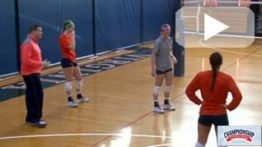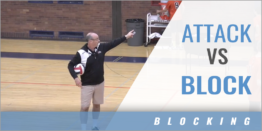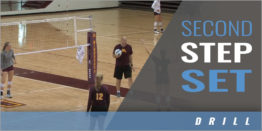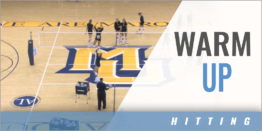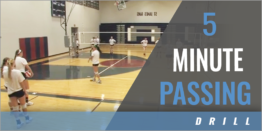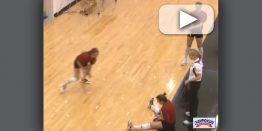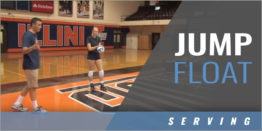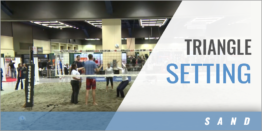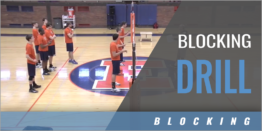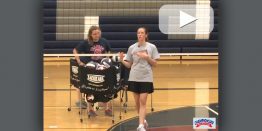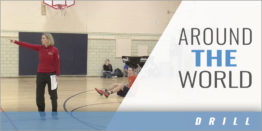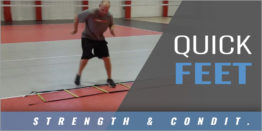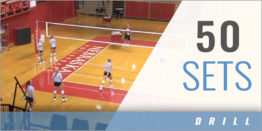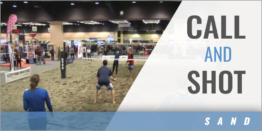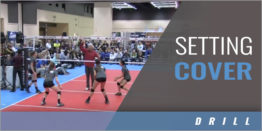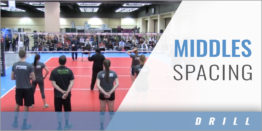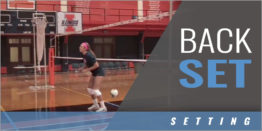Watch as Coach Dennis Hohenshelt explains and his squad demonstrates this Middles Serve Receive Drill.
Four Areas to Maximize your Team’s Practice Session
As coaches begin to plan a practice, one of the first things we think about is how to manage our time efficiently. We’d like to think all of our practices are run with great precision and precise detail. Unfortunately, this isn’t always the…
Blocking Drill – Attack vs. Block with Joel Walton – Ball State Univ.
Watch as Coach Joe Walton explains and players demonstrate this Attack vs Block blocking drill.
Six Tweaks to get your Setter to the Next Level
Let’s say you have a pretty good setter that you want to help become a great setter, or perhaps you coach a team with some great hitters and a decent setter and you just can’t get past a certain round in the postseason. When you’re looking for…
2nd Step Set Drill with Hugh McCutcheon – (Retired) Univ. of Minnesota
Watch as Coach Hugh McCutcheon explains and players demonstrate this 2nd Step Set Drill.
Prehab: Ankle Work with Barry Kagan
Watch as Coach Barry Kagan explains and athletes demonstrate Eversion, Inversion and Dorsi flexion exercises.
A Drill to Improve Quick Hitting
Statistically, the most efficient attack in Volleyball is the Middle quick set, or “1” ball. A good “1” hitter is an outstanding weapon, especially in transition; therefore the ability to slow down or stop a quick attack, especially with one…
Hitting Warm Up with Bond Shymansky – Univ. of Iowa
Watch as Coach Bond Shymansky explains and players demonstrate this hitting warm up drill.
Volleyball Camp Drills and Games
Summer is, of course, prime season for volleyball camps. As anyone who has ever run one knows, camps present their own set of challenges for drill and game selection. When you’re designing a plan for a practice session you at least know the…
5-Minute Passing Drill with Nancy Dorsey – St. James Academy (KS)
Watch as Coach Nancy Dorsey explains and players demonstrate this 5 Minute Passing Drill.
Warm-Up: A Hot Topic
The warm-up has been practiced in some form as long as volleyball has been around. It’s taken for granted and usually not a part of any volleyball conditioning program discussion, but warm-up is a dynamic, critical activity with important…
Ball Control Progression – Anne Kordes
Watch as Coach Anne Kordes discusses and players demonstrate this ball control progression drill.
Prevent Volleyball Shoulder Injuries With These Exercises
It’s thrilling to watch a volleyball player jump high, take aim like a laser and hit a kill so hard that it nearly puts a hole in the gym floor. But all that power and force take a toll on players’ shoulders.
Let’s take a look at some common…
Jump Float Serve with Kevin Hambly – Univ. of Illinois
Watch as Coach Hambly explains and players demonstrate these different types of Jump Float Serves.
Sand: Triangle Setting Drill with Anna Collier – USC
Watch as Coach Anna Collier explains and players demonstrate this Sand – Triangle Setting Drill.
The Great Divide – Lessons Learned From Coaching at the Club Level
I saw it coming from a mile away, but I can’t say I was ever ready for the question my club director asked just three months after starting as a Master Coach. The coach for their top 12s team stepped down for personal reasons, and some – how I…
Blocking Drill with Joel Walton – Ball State Univ.
Watch as Coach Joel Walton explains and players demonstrate this Swing Blocking Drill.
The Difference Between Coaching and Mentoring
Even though a head coach may have recruited every player on her roster, she will have some team members who would prefer not to be coached, or at least not have to change their behaviors to be on the court. But a coach has to make the effort to…
Pursuit Drill – Nancy Dorsey – St. James Academy (KS)
Watch as Coach Nancy Dorsey explains and players demonstrate the Hyperventilate Pursuit Drill.
Around The World Drill with Jen DeJarld – Mother McAuley Liberal Arts HS (IL)
Watch as Coach Jen DeJarld explains and players demonstrate this Around The World Drill.
Quick Feet Endurance Exercises with Rob Rose
Watch as Rob Rose guides an athlete through these Quick Feet Endurance Exercises.
Coaching from a solutions perspective
In my personal opinion, among the best sessions of the HP Coaches Clinic I attended was the one featuring Julio Velasco. Although it was presented on the court, it wasn’t actually one which featured drills or games or anything like that. It was…
50 Sets Drill with John Cook – Univ. of Nebraska
Watch as Coach John Cook and his assistant run the team through the 50 Sets Drill.
Sand Game: Call and Shot with Matt Ulmer – Univ. of Oregon
Watch as Coach Matt Ulmer explains and players demonstrate the importance of verbal communication on every shot.
Does Your Libero Have the “It” Factor?
Some Volleyball players are born with “It.” Others have “It” thrust upon them. Indeed, most coaches know “It” when they see “It.” When it comes to the…
Setting Cover Drill with Rod Walsh
Watch as Coach Rod Walsh explains and players demonstrate this Setting Cover Drill.
Middles Spacing Drill with Tonya Johnson
Watch as Coach Tonya Johnson explains and players demonstrate this Middles Spacing Drill.
Volleyball Conditioning 20-year Report: Lessons Learned
The next issue of Performance Conditioning Volleyball celebrates our 20th year of publishing. It couldn’t have happened without the great support of the American Volleyball Coaches Association and United States Volleyball Association (as it was…
Back Set with Kevin Hambly – Univ. of Illinois
Watch as Coach Kevin Hambly explains and a player demonstrates Proper Back Setting Technique.
Volleyball Try-Out Drill Ideas
Running volleyball try-outs is obviously about assessing players. Oftentimes, however, it’s also a question of managing a large number of players. If you don’t have to manage a lot of players you can run virtually a regular training session which…


